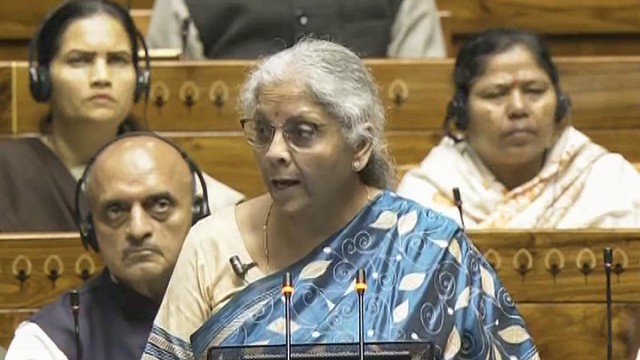"Finance Minister Unveils Ambitious Interim Budget: Propels India Towards Sustained Growth And Inclusive Development"
- Posted on February 01, 2024
- National
- By Admin
- 767 Views

In a momentous announcement, Finance and Corporate Affairs Minister Nirmala Sitharaman presented the Interim Union Budget for the fiscal year 2024-2025, charting a course for India's economic future. With a focus on sustained growth, inclusive development, and fiscal responsibility, the budget addresses key sectors, embraces reforms, and underscores the government's commitment to the welfare of the nation.
Part-A: Accelerating Economic Momentum
In her presentation of the Interim Union Budget for 2024-2025, Finance and Corporate Affairs Minister Nirmala Sitharaman announced a substantial 11.1% increase in the capital expenditure outlay, reaching Rs 11,11,111 crore. This constitutes 3.4% of the GDP and is a continuation of the government's efforts to boost economic growth and employment, following a remarkable tripling of the capital expenditure outlay over the past four years.
The economic outlook for India remains robust, with the First Advance Estimates projecting a Real GDP growth of 7.3% for the fiscal year 2023-24. The Reserve Bank of India (RBI) has upwardly revised its growth projections from 6.5% to 7%, attributing it to strong growth in the second quarter of the fiscal year. Notably, the International Monetary Fund (IMF) has also revised its growth projection for India to 6.3%, indicating global confidence in India's economic prowess amid unchanged global growth projections for 2023 at 3%.
India's rise on the global economic stage is evident, with the IMF forecasting it to become the third-largest economy by 2027 in USD at market exchange rates. Various international agencies, including the World Bank, IMF, OECD, and ADB, project India's growth between 6.1% and 6.7% for the fiscal year 2024-25.
Finance Minister Sitharaman highlighted the resilient macro-economic fundamentals of the Indian economy despite global challenges. She noted the seventh consecutive occurrence of gross GST revenues surpassing the ₹1.6 lakh crore benchmark, reaching ₹1.65 lakh crore in December 2023.
Looking ahead to the fiscal year 2024-25, the total receipts, excluding borrowings, and total expenditure are estimated at Rs 30.80 and 47.66 lakh crore, respectively, with tax receipts projected at Rs 26.02 lakh crore. The Finance Minister emphasized the continuation of the fifty-year interest-free loan scheme for capital expenditure to states, allocating a total outlay of Rs 1.3 lakh crore to support state governments' Viksit Bharat reforms.
In a nod to fiscal consolidation, Sitharaman mentioned the government's commitment to reducing the fiscal deficit below 4.5% of GDP by 2025-26, with the fiscal deficit estimated at 5.1% of GDP in 2024-25. Gross and net market borrowings through dated securities during 2024-25 are anticipated to be Rs 14.13 and 11.75 lakh crore, respectively, both lower than the figures for 2023-24.
The Finance Minister underlined India's positive economic transformation over the last ten years, with 25 crore people lifted out of multi-dimensional poverty. Initiatives like the PM Mudra Yojana, which sanctioned 43 crore loans totaling Rs 22.5 lakh crore, have significantly contributed to empowering entrepreneurs, particularly women.
Part-B: Taxation and Fiscal Prudence
The Interim Budget for 2024-2025 does not propose changes in taxation, maintaining the existing rates for both direct and indirect taxes, including import duties. However, certain tax benefits for start-ups and investments made by sovereign wealth or pension funds have been extended for an additional year until March 31, 2025.
In a move to improve taxpayer services and enhance ease of living and doing business, Finance Minister Sitharaman announced the withdrawal of outstanding direct tax demands. Petty, non-verified, non-reconciled, or disputed direct tax demands, dating back to 1962, up to Rs 25,000 for the period up to the financial year 2009-10 and up to Rs 10,000 for financial years 2010-11 to 2014-15 will be withdrawn. This initiative is expected to benefit approximately one crore taxpayers.
Sitharaman expressed gratitude to taxpayers for their support, highlighting the more than threefold increase in direct tax collections over the last ten years and a 2.4 times growth in return filers. The government's focus on improving taxpayer services has led to the transformation of the jurisdiction-based assessment system, simplifying the filing of tax returns and reducing the average processing time from 93 days in 2013-14 to just ten days in the current year.
On the indirect tax front, Sitharaman emphasized the positive impact of the Goods and Services Tax (GST) in unifying the previously fragmented indirect tax regime. The tax base of GST has more than doubled, and average monthly gross GST collections have almost doubled to Rs 1.66 lakh crore in the current fiscal year.
The Finance Minister announced the upcoming release of a white paper on the status of the Indian economy, providing insights into the progress made since 2014 and lessons learned from the challenges faced during that period. This marks a transparent effort to learn from past mismanagement and inform future economic policies.
Minister Sitharaman's budget speech resonates with a vision of an empowered and developed India. From a comprehensive focus on the poor, women, youth, and farmers to major infrastructure initiatives, the budget lays the groundwork for a 'Viksit Bharat' by 2047. As the Finance Minister concluded, the full budget in July will present a detailed roadmap for this pursuit of national development, reflecting a continued commitment to the people and the nation's economic prosperity.



